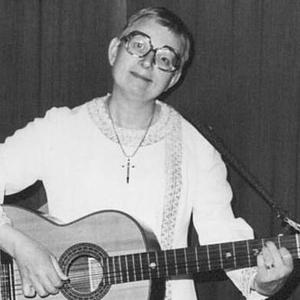The strange and sad saga of one of pop music’s least likely hitmakers.

The superiors at the convent thought Sister Luc-Gabrielle should make a limited-press album—they could sell those records of original religious songs to people who visited the convent or who attended their religious retreats. The convent booked time for the sister at Philips Studio in Brussels in 1962. While it’s fairly common for church choirs or religious performers to self-release an album, then and now, the engineers at Philips thought Sister Luc-Gabrielle was more than just another church singer—they thought her gentle, lilting folk songs could make her a pop star. So they signed her to a contract, and presented her to the public as Soeur Sourire, or “Sister Smile.”
The engineers at Philips were right. In 1963, Soeur Sourire’s “Dominique” was released as a single in Belgium. About St. Dominic, the 13th century founder of the Dominican order, and sung in French, it became a #1 hit all over Europe, even where French wasn’t widely spoken. It was so big it crossed over to the U.S. in late 1963. Radio programmers at the time were eager to fill the air with the gentlest music they could find, aiming to soothe Americans after the assassination of President Kennedy.
“Dominique” went to #1 in the U.S. She was still billed as Soeur Sourire…although everybody just called her “the Singing Nun.” She embarked on a worldwide tour, appeared on The Ed Sullivan Show, and her album Her Joys, Her Songs sold two million copies. Deckers’ cut of the proceeds went directly to her convent.
It was almost inexplicable that a nun singing a song in French about a Catholic saint could have been a #1 single. So much so that Soeur Sourire couldn’t repeat the feat. After “Dominique” mania calmed down and Her Joys, Her Songs produced no more hits, the convent sent Deckers to receive secondary theology training. There, she became reacquainted with an old childhood friend named Anne Pelcher. In 1966, Deckers and Pelcher went to Africa to do social work and became lifelong companions.
In 1968, Deckers further distanced herself from her religious life. She was an outspoken critic of the Catholic Church’s anti-contraception stance, publicly supporting birth control with an attempted comeback single called “Glory Be to God For the Golden Pill.” The song was not a hit.
The controversy surrounding the song (and rumors that Deckers and Pelcher were romantically involved) led to Deckers being ousted from her convent. In the 1970s, she attempted to jumpstart her musical career with a children’s album of religious and secular songs called I Am Not a Star in Heaven, under the name “Luc-Dominique,” allegedly because her old convent owned the rights to the name Soeur Sourire. The album flopped.
By 1982, Deckers was broke, yet owed the Belgian government thousands in unpaid back taxes over royalties from “Dominique.” Deckers claimed that since her convent took that money, then they should pay the taxes on it. The convent disagreed— because they were just a poor, struggling convent and didn’t have the money. Deckers was ruled to be on the hook for $63,000 in back taxes. In a quick-cash-grabbing move, Deckers recorded yet another would-be comeback single: “Dominique”—a synthesizer-heavy disco version of her only hit.
That comeback didn’t work either, and Deckers fell farther into debt. Sadly, she and Pelcher committed suicide together in 1985.
Most of these controversial details were not included in The Singing Nun, a highly fictionalized version of Deckers’ life released in 1966 and starring Debbie Reynolds.







